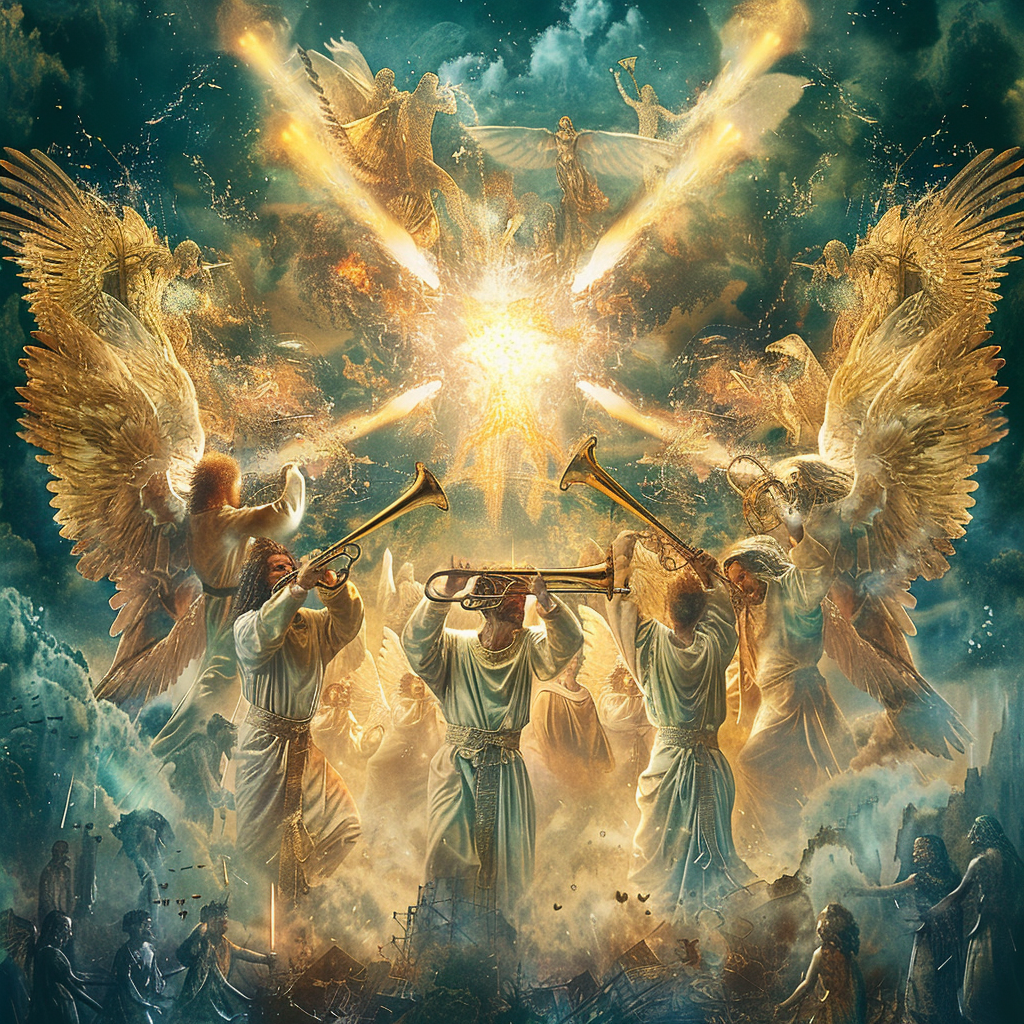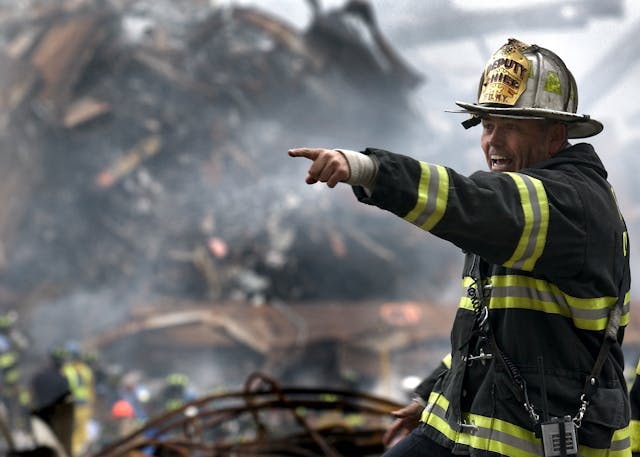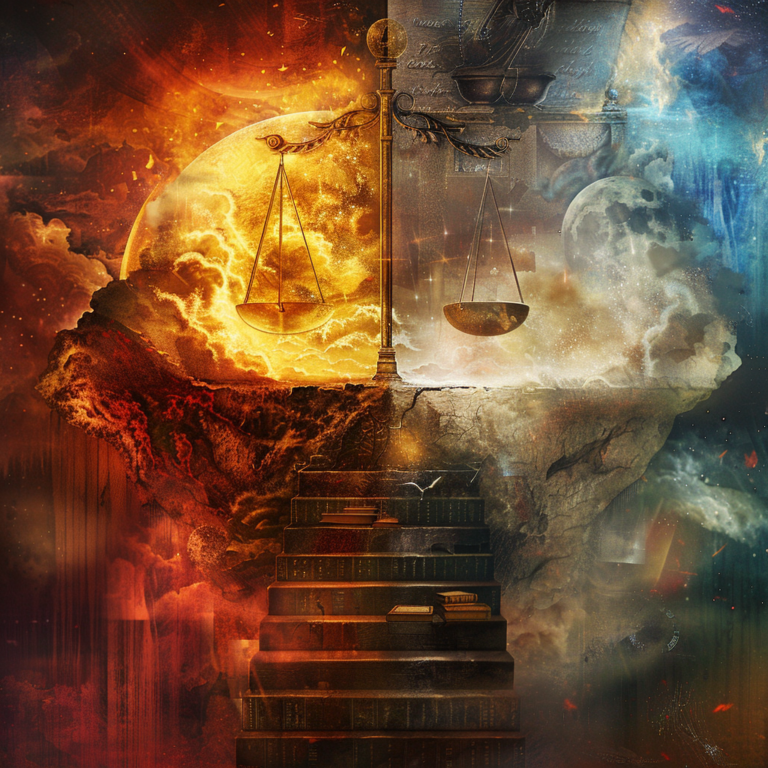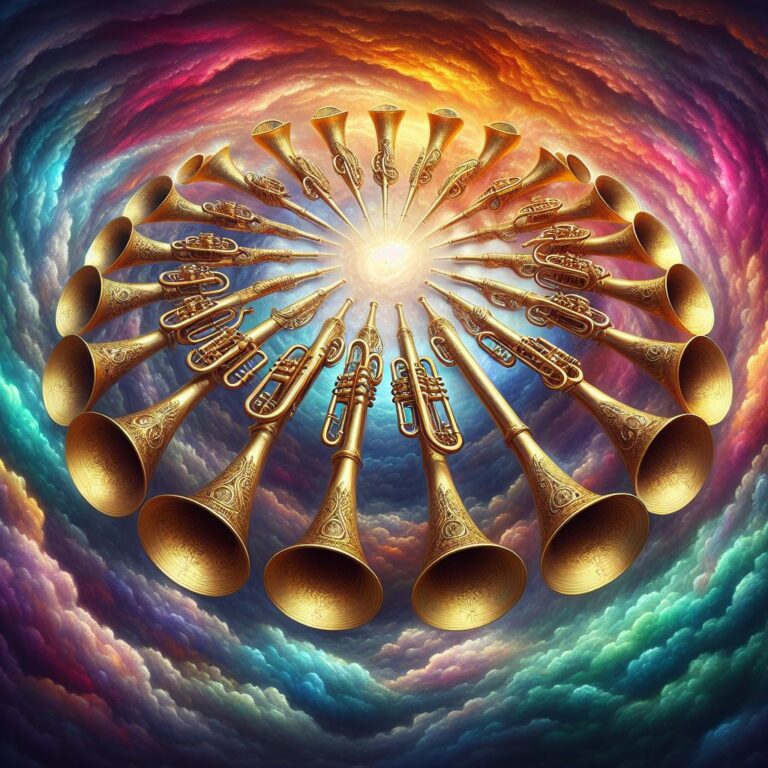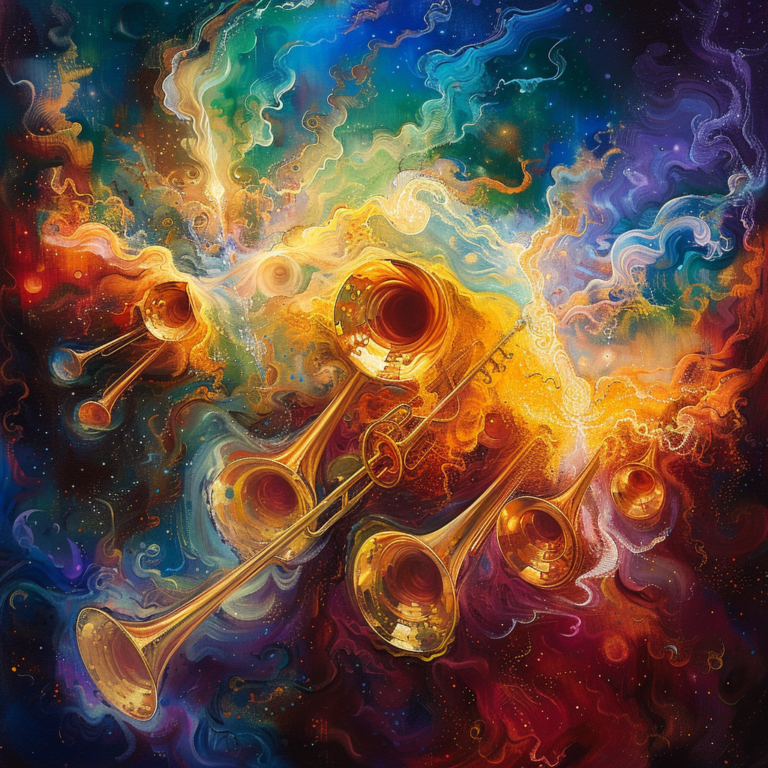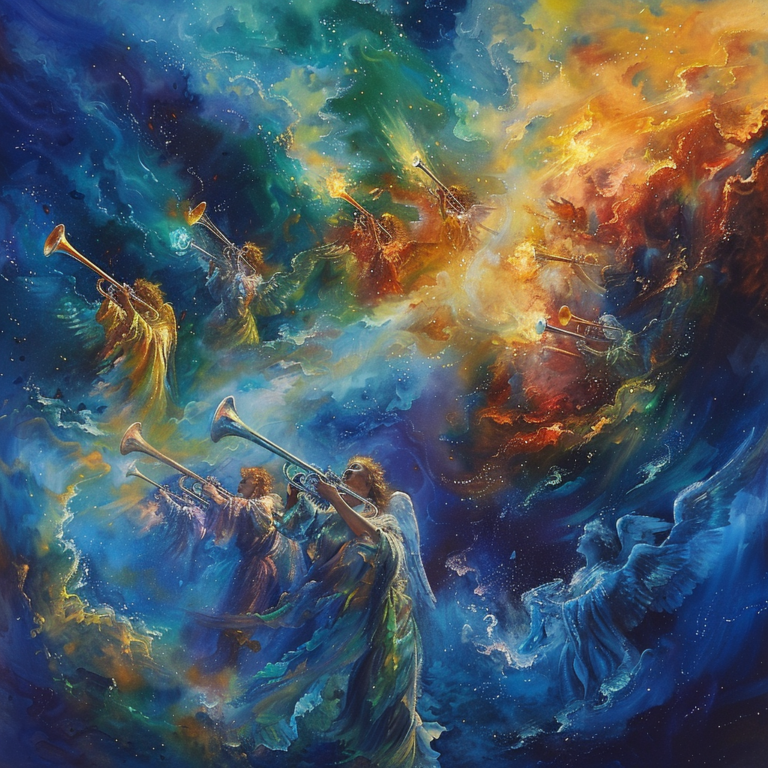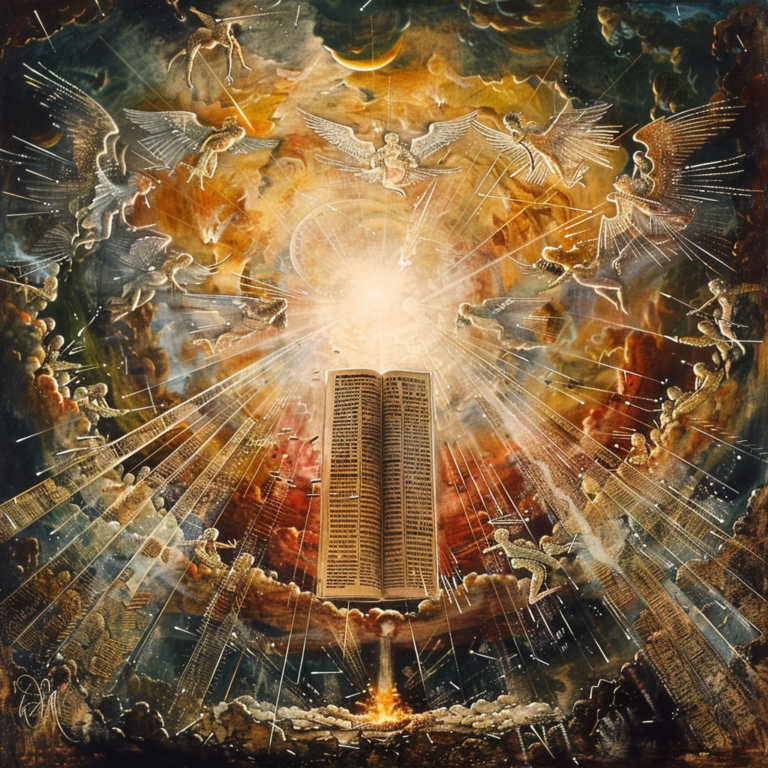Are The 7 Trumpets of Revelation Happening Now? Answered!
Are the 7 trumpets of revelation happening now?
The Book of Revelation, the final book of the New Testament, contains vivid and symbolic descriptions of the end times.
Among these prophecies are the Seven Trumpets, which are described in chapters 8 and 9.
These trumpets are sounded by seven angels, and each trumpet signals a series of catastrophic events that will unfold on the earth.
The seven trumpets are as follows:
- Hail and fire mixed with blood
- Something like a great mountain burning with fire cast into the sea
- A great star called Wormwood falls from heaven, making waters bitter
- A third of the sun, moon, and stars are struck, affecting day and night
- The bottomless pit is opened, and locusts with scorpion-like stingers torment humanity
- Four angels bound at the Euphrates River are released, leading an army that kills a third of mankind
- The seventh trumpet ushers in the final judgment and the establishment of God’s kingdom on earth
These events are described in vivid and symbolic language, leaving their precise interpretation open to debate among scholars and believers.
Biblical Context and Interpretation of the 7 Trumpets
To understand the significance of the Seven Trumpets of Revelation, it is crucial to consider the biblical context in which they are presented.
The Book of Revelation is a prophetic work written by the Apostle John, who received these visions while exiled on the island of Patmos.
The trumpets are part of a larger narrative that unfolds in the book, which includes the opening of the Seven Seals and the pouring out of the Seven Bowls of God’s wrath.
These events are believed to occur during the Great Tribulation, a period of intense suffering and turmoil that precedes the Second Coming of Christ and the establishment of God’s kingdom on earth.
There are various interpretations of the Seven Trumpets, with different Christian traditions and scholars offering their perspectives. Here are some of the main viewpoints:
- Historicist Interpretation: This view sees the trumpets as representing specific historical events that have already occurred or are currently unfolding. For example, some interpret the first four trumpets as referring to the decline of the Roman Empire, the invasion of barbarian tribes, and the rise of Islam.
- Futurist Interpretation: According to this perspective, the trumpets represent literal, future events that will take place during the end times. Proponents of this view believe that the trumpets have not yet been fulfilled and will occur in the order described in Revelation.
- Idealist or Spiritual Interpretation: This viewpoint sees the trumpets as symbolic representations of the ongoing spiritual battle between good and evil, rather than specific historical or future events.
- Preterist Interpretation: Preterists believe that the events described in Revelation, including the trumpets, were primarily fulfilled in the first few centuries after the book was written, particularly in relation to the fall of Jerusalem and the persecution of early Christians.
Regardless of the specific interpretation, the Seven Trumpets are understood as divine judgments that will precede the ultimate triumph of God and the establishment of His eternal kingdom.
Many Christians believe that studying these prophecies can provide insights into the end times and encourage believers to remain faithful and vigilant as they await Christ’s return.
Signs and Events Potentially Fulfilling the Trumpets of Revelation
As people contemplate the possibility of the Seven Trumpets of Revelation being fulfilled in our time, various events and phenomena have been proposed as potential signs or indicators of their fulfillment. Here are some examples:
Natural Disasters and Environmental Calamities:
- Severe storms, hurricanes, and cyclones (hail and fire mixed with blood)
- Massive volcanic eruptions and meteors/asteroids impacting the earth or oceans (a great mountain burning with fire cast into the sea)
- Contamination of water sources and the depletion of aquifers (waters becoming bitter)
- Disruptions in the Earth’s atmosphere and climate patterns (affecting the sun, moon, and stars)
Warfare and Conflicts:
- Escalating tensions and conflicts in the Middle East, particularly involving the Euphrates River region (four angels bound at the Euphrates River released)
- The rise of extremist ideologies and terrorist organizations (locusts with scorpion-like stingers tormenting humanity)
- The development and potential use of weapons of mass destruction (killing a third of mankind)
Social and Moral Decline:
- Increasing secularism, moral relativism, and the rejection of traditional Judeo-Christian values
- The normalization of practices and behaviors condemned in Scripture
- The persecution and marginalization of Christians and other religious minorities
Political and Economic Upheaval:
- The rise and fall of global powers and shifts in the balance of power
- Economic crises, financial instability, and the potential collapse of monetary systems
- The emergence of a global governance system or a one-world government
Technological Advancements and Scientific Breakthroughs:
- The development of advanced artificial intelligence and biotechnologies
- The manipulation of the human genome and the blurring of lines between humans and machines
- The potential discovery of extraterrestrial life or the disclosure of government knowledge about UFOs
Note that these are merely potential signs and that their interpretation is subjective. Many Christians caution against setting specific dates or making definitive claims about the fulfillment of biblical prophecies, as the timing and manner of their unfolding remain known only to God.
Arguments Against the Trumpets of Revelation Happening Now
While some individuals and groups believe that the Seven Trumpets of Revelation are being fulfilled in our current times, there are also compelling arguments against this assertion.
Here are some perspectives that challenge the idea that the trumpets are happening now:
a). Lack of Clear and Undeniable Signs
While various events and phenomena have been proposed as potential fulfillments of the trumpets, many argue that these are subjective interpretations and that there are no clear, undeniable signs that definitively point to the trumpets being fulfilled.
The descriptions in Revelation are highly symbolic and open to multiple interpretations.
b). Historically Recurring Events
Throughout history, numerous events have been interpreted as potential fulfillments of biblical prophecies, including the trumpets.
However, as time has passed, these interpretations have often been proven incorrect or premature.
Many argue that the current events being cited as signs of the trumpets are not unique and have occurred in various forms throughout human history.
c). Misunderstanding of Prophetic Timelines
Some scholars argue that those who believe the trumpets are happening now may be misunderstanding the prophetic timelines and sequence of events described in Revelation.
The trumpets are part of a larger narrative that includes the opening of seals, the pouring out of bowls, and the return of Christ.
Attempting to isolate and pinpoint the fulfillment of the trumpets without considering the broader context can lead to misinterpretations.
d). Overemphasis on Current Events
Critics argue that those who claim the trumpets are happening now may be placing too much emphasis on current events and news headlines, while overlooking the broader historical and scriptural context.
They suggest that this approach can lead to sensationalism and a distortion of the intended meaning of the prophecies.
e). Theological Differences
Different Christian denominations and traditions have varying interpretations of the Book of Revelation and the end times prophecies.
Some argue that those who believe the trumpets are happening now may be influenced by specific theological biases or interpretive frameworks that are not universally accepted within the broader Christian community.
Ultimately, the debate surrounding the fulfillment of the Seven Trumpets of Revelation highlights the complexity and diversity of perspectives within Christianity.
While some individuals and groups are convinced that these prophecies are unfolding in our times, others caution against making definitive claims and encourage a more nuanced and contextual understanding of the biblical text.
Perspectives from Different Christian Denominations on the 7 Trumpets
The interpretation of the Seven Trumpets of Revelation, as well as their potential fulfillment in our current times, is a topic that has generated diverse perspectives among various Christian denominations and traditions.
Here’s a look at how some major denominations approach this subject:
a). Catholicism
The Catholic Church generally takes a more symbolic and allegorical approach to interpreting the Book of Revelation, including the Seven Trumpets.
While acknowledging the prophetic nature of the text, the Church cautions against attempting to pinpoint specific events or timelines for the fulfillment of these prophecies.
Instead, the focus is on the overall message of God’s ultimate triumph over evil and the establishment of His eternal kingdom.
b). Protestantism
Within Protestantism, there is a wide range of perspectives on the Seven Trumpets.
Some denominations, such as certain Baptist and Evangelical groups, tend to adopt a more literalist or futurist interpretation, believing that the trumpets represent specific events that will occur in the end times.
Others, like mainline Protestant churches (e.g., Lutherans, Presbyterians, Methodists), may take a more symbolic or spiritual approach.
c). Dispensationalism
Dispensationalism is a theological system popular among certain Evangelical and Fundamentalist Protestant groups, which views history as divided into distinct dispensations or periods.
Many dispensationalists believe that the Seven Trumpets are part of the future tribulation period, with each trumpet representing a specific judgment or event leading up to the Second Coming of Christ.
d). Adventism
The Seventh-day Adventist Church has a unique perspective on the Seven Trumpets, interpreting them as historical events that have already occurred or are currently unfolding.
For example, they may associate the trumpets with events such as the fall of the Western Roman Empire, the rise of Islam, and the Protestant Reformation.
d). Eastern Orthodox
In the Eastern Orthodox tradition, the interpretation of the Seven Trumpets is generally more symbolic and mystical.
The focus is on the spiritual and moral lessons that can be drawn from these prophecies, rather than attempting to pinpoint their literal fulfillment in specific historical or contemporary events.
e). Restorationism
Some restorationist movements, such as the Latter-day Saint (Mormon) faith, have their own unique interpretations of the Seven Trumpets and how they fit into their theological framework and understanding of the end times.
Note that even within these broader denominational traditions, there can be variations and nuances in how individual churches, pastors, or scholars approach the interpretation of the Seven Trumpets.
Additionally, many Christians from various backgrounds may hold more eclectic or non-denominational perspectives on this topic.
Ultimately, the diversity of viewpoints highlights the complexity and richness of biblical interpretation within Christianity.
While some may claim certainty about the fulfillment of the Seven Trumpets in our times, others maintain a more cautious or open-ended approach, recognizing the symbolic and mysterious nature of these prophecies.
Potential Timelines and Prophetic Implications of the 7 Trumpets
If one subscribes to the belief that the Seven Trumpets of Revelation are indeed being fulfilled in our current times, it is natural to wonder about the potential timelines and prophetic implications associated with these events. Here are some perspectives on this matter:
- The Sequence of Events:
According to the Book of Revelation, the Seven Trumpets are part of a broader sequence of events that includes the opening of the Seven Seals and the pouring out of the Seven Bowls of God’s wrath. Many interpretations suggest that the trumpets will precede the bowls and will occur during the Great Tribulation, a period of intense suffering and upheaval before the Second Coming of Christ. - The Rapture Debate:
One of the most divisive debates among Christians who believe in a literal interpretation of the end times prophecies is the timing of the Rapture – the event when believers are caught up to meet Christ in the air. Some believe the Rapture will occur before the Tribulation (pre-tribulation), while others place it during the middle (mid-tribulation) or after the Tribulation (post-tribulation). The timing of the Rapture in relation to the Seven Trumpets is a subject of ongoing discussion. - The Millennial Kingdom:
Many interpretations suggest that after the Seven Trumpets and the pouring out of the Seven Bowls, Christ will return to establish His millennial kingdom on earth. This is often understood as a literal 1,000-year reign of peace and righteousness, during which Satan will be bound, and the world will be restored to its intended state. - The Final Judgment and Eternity:
According to the Book of Revelation, the sounding of the Seventh Trumpet will usher in the final judgment, where the dead will be raised, and all will face God’s judgment. This will be followed by the creation of a new heaven and a new earth, where God’s redeemed people will dwell in His presence for eternity. - Potential Timeline Projections:
While the Bible does not provide specific dates or timelines for the fulfillment of these prophecies, some scholars and interpreters have attempted to make projections based on their understanding of biblical chronology and current events. However, it is important to note that these projections are speculative and subject to varying interpretations and assumptions.
Regardless of the specific timelines or interpretations, many Christians who believe in the imminent fulfillment of the Seven Trumpets emphasize the importance of readiness, spiritual preparedness, and a steadfast faith in God’s sovereignty.
They view these prophecies as a call to repentance, watchfulness, and a deeper commitment to living according to God’s will in anticipation of Christ’s return.
Key Takeaways
- The Seven Trumpets of Revelation are a series of prophetic events described in the Book of Revelation, which many Christians believe will precede the Second Coming of Christ.
- There are diverse interpretations among different Christian denominations and traditions regarding the symbolism and potential fulfillment of the Seven Trumpets.
- Some view current events and phenomena (natural disasters, conflicts, moral decline) as potential signs of the trumpets being fulfilled, while others argue against making definitive claims.
- If the trumpets are happening now, it may indicate the imminent arrival of the Great Tribulation, the Millennial Kingdom, and the final judgment, as described in Revelation.
- Regardless of one’s interpretation, the Seven Trumpets serve as a call to spiritual preparedness, repentance, and a steadfast faith in God’s ultimate plan for humanity.
Read also:
